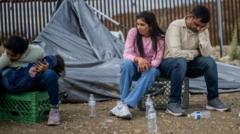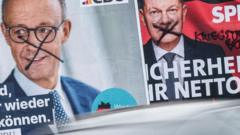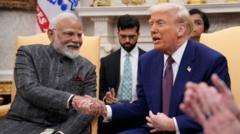As Germany approaches the February 23 elections, the political climate is increasingly polarized, reflecting a shift in public sentiment towards immigration and national security.
**Tensions Rise in Germany as Election Approaches Amid Immigration Concerns**

**Tensions Rise in Germany as Election Approaches Amid Immigration Concerns**
German citizens express growing apprehension about immigration following recent attacks attributed to asylum seekers as elections near.
In the heart of Oberhausen, Germany, Alya recalls the traumatic journey she undertook a decade ago from war-torn Syria, arriving in Germany with her infant son, Rami. The horror resurfaced for her upon hearing news of a recent attack in Munich that tragically claimed the lives of a mother and her toddler. The incident echoed a disturbing pattern of violence involving asylum seekers, reigniting debates surrounding immigration and safety just days ahead of Germany's pivotal election on February 23.
Alya and Rami, now settled in their adopted home, are part of the 1.2 million asylum seekers who arrived during the 2015-16 migrant crisis. While Alya has embraced her new life, integrating into society through language and work, she has also noticed a chilling shift in attitudes. Many immigrants have reportedly struggled to assimilate fully, prompting her concern over the rising sentiments encapsulated in phrases like "Ausländer raus" (foreigners out).
The transformations extend beyond individual experiences; they reflect broader societal concerns. Georg, a long-time resident of Oberhausen, expresses unease about radicalization and calls for heightened security, voicing frustration over the declining infrastructure and a perceived lack of investment in the community. This sentiment is echoed by many citizens seeking reassurance in uncertain times.
Meanwhile, the political scene is fraught with tension. With opposition parties advocating for more stringent immigration controls and xenophobic rhetoric gaining traction, demonstrations against the far-right Alternative for Germany (AfD) party highlight the divisive nature of the current discourse. A recent encounter shows the stark divide: AfD activists clashed with residents, leading to accusations of racism and growing mistrust among communities.
Voters are increasingly torn, with calls from various political entities ranging from the Christian Democrats' proposed “border ban” to the Social Democrats' aim of expedited asylum procedures and deportations. The AfD is pushing for an outright closure of borders and a rejection of current European asylum policies.
In this climate of division, the future of Germany's migration policy hangs in the balance, contingent upon the outcomes of forthcoming elections. Alya hopes for an open-door policy, emphasizing the continued necessity for refuge amid ongoing global crises. The evolving political landscape suggests that a rightward shift in rhetoric is already underway, demanding vigilance among voters as they navigate their choice on February 23.
Alya and Rami, now settled in their adopted home, are part of the 1.2 million asylum seekers who arrived during the 2015-16 migrant crisis. While Alya has embraced her new life, integrating into society through language and work, she has also noticed a chilling shift in attitudes. Many immigrants have reportedly struggled to assimilate fully, prompting her concern over the rising sentiments encapsulated in phrases like "Ausländer raus" (foreigners out).
The transformations extend beyond individual experiences; they reflect broader societal concerns. Georg, a long-time resident of Oberhausen, expresses unease about radicalization and calls for heightened security, voicing frustration over the declining infrastructure and a perceived lack of investment in the community. This sentiment is echoed by many citizens seeking reassurance in uncertain times.
Meanwhile, the political scene is fraught with tension. With opposition parties advocating for more stringent immigration controls and xenophobic rhetoric gaining traction, demonstrations against the far-right Alternative for Germany (AfD) party highlight the divisive nature of the current discourse. A recent encounter shows the stark divide: AfD activists clashed with residents, leading to accusations of racism and growing mistrust among communities.
Voters are increasingly torn, with calls from various political entities ranging from the Christian Democrats' proposed “border ban” to the Social Democrats' aim of expedited asylum procedures and deportations. The AfD is pushing for an outright closure of borders and a rejection of current European asylum policies.
In this climate of division, the future of Germany's migration policy hangs in the balance, contingent upon the outcomes of forthcoming elections. Alya hopes for an open-door policy, emphasizing the continued necessity for refuge amid ongoing global crises. The evolving political landscape suggests that a rightward shift in rhetoric is already underway, demanding vigilance among voters as they navigate their choice on February 23.






















